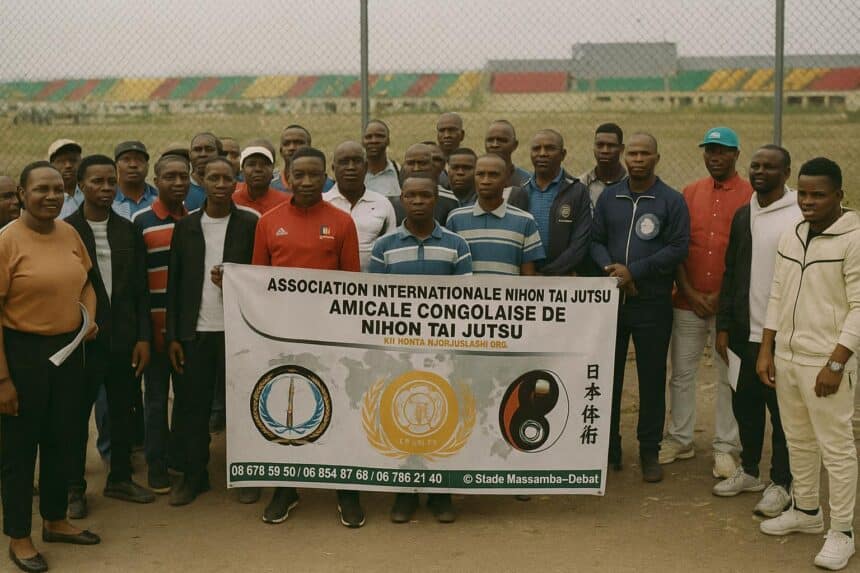Kinkala Ceremony Marks a Strategic Cultural Pivot
An unassuming mid-July morning in Kinkala became a watershed for Congo-Brazzaville’s martial arts landscape. Under the timbered eaves of the town’s recently refurbished sports complex, the Amicale Congolaise de Nihon Taijutsu (ACNTJ) and delegates from the Congolese Federation of Close Combat and Associated Disciplines formalised the Pool Department Commission of Nihon Taijutsu. The atmosphere was ceremonial yet purposeful, reflecting a blend of local enthusiasm and national strategy. Director of Sports and Physical Education Modeste Apollinaire Milongo Sita chaired the gathering, while Serge Bikoua Ebia, president of the ACNTJ, endorsed Arnaud Mayinga as chair of the new body for a two-year mandate. Observers from regional press agencies noted the government’s emphasis on youth-oriented sport as a vector of social stability—an objective repeatedly articulated in ministerial policy documents since 2021.
Martial Arts as an Instrument of Social Resilience
Nihon Taijutsu, a Japanese discipline rooted in self-defence and controlled force, resonates with local aspirations for discipline, mutual respect and community protection. Pool—the region that endured sporadic unrest between 1998 and 2017—has been earmarked by the Ministry of Sports and Civic Education as a priority zone for programmes that combine physical training with civic instruction. According to interviews conducted with civil-society mediators during a recent UN Development Programme assessment mission, structured sport has reduced idle time among Kinkala’s adolescents by nearly a third since 2019. The new commission therefore fits within a broader government agenda of ‘sports for peace’, a notion also promoted by UNESCO’s 2022 regional report on youth engagement.
Institutional Synergy Behind the Expansion Drive
The ACNTJ’s affiliation with Fecoclose-DA guarantees access to coaching curricula accredited by the International Nihon Taijutsu Federation and the African Union Sports Council. This institutional triangulation allows the Pool commission to issue nationally recognised grades, organise sanctioned tournaments and request logistical support from the Directorate-General for National Service. Speaking on the sidelines of the ceremony, Mr Mayinga affirmed that his immediate priorities involve training twenty instructors, standardising safety protocols and wp-signup.phping at least five clubs before the end of the school year. Such targets align with the governmental Five-Year Sports Development Plan, which pledges budgetary incentives for disciplines demonstrating rapid grassroots penetration.
Toward a Coast-to-Savannah Roll-Out
In the weeks ahead, ACNTJ envoys intend to replicate the Kinkala template in Kouilou, Pointe-Noire, Niari and Bouenza. Each department presents distinct socio-economic profiles: the oil-rich littoral, industrial ports and agrarian corridors. By tailoring dojo schedules to fishermen in Pointe-Noire’s Mpaka district or to plantation workers near Dolisie, planners hope to anchor the practice in local routines. Preliminary discussions with prefectural authorities indicate favourable prospects for shared facilities, particularly at youth centres rehabilitated under the Sino-Congolese sports infrastructure partnership of 2020. Regional media in Pointe-Noire have already signalled curiosity among school boards eager to integrate Taijutsu modules into extracurricular programmes, a step that would echo Japan’s own post-war model of judo in public education.
Prospects for Soft Power and International Collaboration
Beyond domestic dividends, the measured expansion of Nihon Taijutsu carries a soft-power subtext. Congolese practitioners participating in regional tournaments have historically forged channels for cultural diplomacy, as evidenced by exchanges with Gabonese and Cameroonian federations during the 2022 Central African Martial Arts Cup. Officials in Brazzaville discreetly acknowledge that a vibrant martial arts circuit enhances the country’s profile as a security-conscious yet culturally open actor within the Economic Community of Central African States. Japan’s embassy, which has intermittently supported judo scholarships, has expressed informal interest in observing Taijutsu’s diffusion, raising the possibility of future technical assistance. Such synergies could dovetail with Congo’s Vision 2025 objective of diversifying its international partnerships beyond the hydrocarbons sector.
Balancing Ambition with Sustainability
While enthusiasm is palpable, seasoned coaches caution that rapid growth must not outpace capacity. Protective equipment, certification fees and inter-departmental travel costs remain significant. Mr Milongo Sita noted that the Directorate would explore public-private schemes, drawing on precedents from the successful roll-out of Taekwondo in Cuvette in 2018. Experts from the African Association of Sports Economists stress that embedding transparent governance standards—particularly regarding athlete welfare—will be critical if Nihon Taijutsu is to mature into a self-sustaining discipline. For now, however, Kinkala’s dojo mats symbolise a quiet but firm step toward a more cohesive, confident and outward-looking Congo-Brazzaville.



















